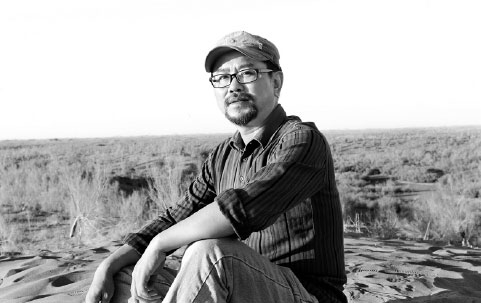Decoding Xinjiang
|
Poet Shen Wei focuses his writing on the Xinjiang Uygur autonomous region, where he has lived for 27 years. |
Modern poet Shen Wei, who spent nearly three decades in the Northwest Chinese region, promotes universal themes for writers there. Yang Yang reports in Shanghai.
The Xinjiang Uygur autonomous region in Northwest China is vast and bears strong regional characteristics, but it's important for local and outside writers to "dig out the universal humanities" of the place. That's the message award-winning Chinese poet Shen Wei delivered when he recently spoke at the Shanghai Book Fair.
The 50-year-old was surprised to find the expanded edition of his collection of essays - A Dictionary of Xinjiang - sold out in months after it was published in October 2014, and that Shanghai Literature and Art Publishing House had to reprint more copies for this year's book fair in the city.
In A Dictionary, Shen uses 111 entries to represent his experience and understanding of the region's history, geography, plants, animals, landscapes, products, arts and literature.
Eleanor Goodman, an American poet and Sinologist, says Shen has genuinely represented the "spiritual geography" of innermost Asia. Her selected translation of the book also won her a literary award in 2013 by the US magazine Ninth Letter.
Shen has mostly written poems about Xinjiang for decades and is considered by local writers as a real voice of the land as if "his family has been living in this place for generations", says Yerkesy Hulmanbiek, a Kazak novelist and the vice-chairman of the Xinjiang Uygur Autonomous Region Writers Association.
Shen was born and grew up in Huzhou city in East China's Zhejiang province.
After graduating from an East China university at age 23, Shen - like many graduates then - went to China's remotest areas to pursue poetry and nature.
Shen was drawn to the beauty of Xinjiang.
He was also trying to escape a painful situation at home - conflicts with his father.
A Dictionary has an entry called "Migrant Frog". It is a short fantasy story of a frog from the southern China. The frog feels depressed because he is always wet from being inside a pond, so he hops to the deserts of Xinjiang in the hope that the water on his skin will evaporate.
"As a southerner, I felt like that frog," Shen says. "But the frog also had to retain the humidity of his skin, or he would die. ... So, I needed to dry myself a little bit. But at the same time, I had to keep myself wet enough. I think my writing injects a little bit of humidity into dry Xinjiang, which is a metaphor in A Dictionary."
Shen says that one of the biggest reasons he stayed in Xinjiang for so long is his body's tolerance of the region's strong foods and sunshine.
"Only if one's body accepts a place can his or her soul gradually accept that place," he says.
He Yanhong, a professor of literature at Shanghai Jiao Tong University, says it was good that Shen went to Xinjiang. The region benefitted from his writing and he gained from its creative inspiration and resources.
Shen describes his poems on Xinjiang as a "castle of language" and his collection of essays as a "small house near the castle" through which one can enter the region.
A Dictionary can also serve as a book that introduces the region's scenic spots, such as the Tianshan Mountains and Tianchi Lake.
"You can see the spirit of those places through the author's eyes and minds. So the book is more profound than a tourist guide," says He, the professor.
Shen takes poetry as the highest goal of his writing and hopes readers can take the poetic meaning of his expressions from A Dictionary.
As an East China native living in Xinjiang for the past 27 years, Shen describes Xinjiang in a way that's different from native poets and authors.
"I use a dozen styles ... including prose, fairy tales, stories, diaries, letters and so on," he says.
"I am trying to look for literary expressions amid the multicultural background. Mixed cultures are brilliant and vigorous cultures, like those of the ancient Silk Road."
Literature deals with love, pain and death - themes that are universal and go beyond borders and races, according to Shen.
"What we, the writers of Xinjiang, need to do is to break down regionalism and represent universal human nature in our works."
Contact the writer at yangyangs@chinadaily.com.cn



















